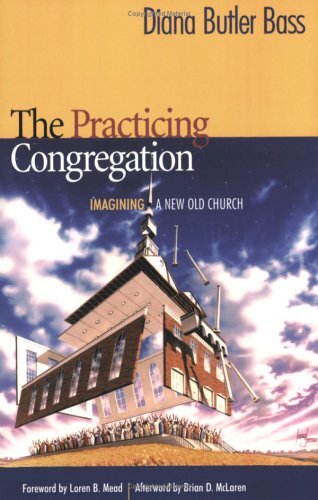Diana Butler Bass, The Practicing Congregation: Imagining a New Old Church. Alban Institute, 2004.
Sequels:
Referenced in: Research and Case Studies on Effective Churches
LifeandLeadership.com Summary
This is the first of three volumes that reflect the findings of “The Project on Congregations In Intentional Practice” out of Virginia Theological Seminary, which studied fifty mainline denominational congregations ranging in size from 35 to 300 that experienced renewed senses of identity, vocation, and mission. Ten of these congregations were chosen for more in-depth ethnographic research. These congregations embraced particular Christian practices that helped them make sense of the gospel in their unique contexts. The two follow-up volumes in the series include From Nomads to Pilgrims (2005) and Christianity for the Rest of Us (2007).
Like Anthony Robinson’s Transforming Congregational Culture and Changing the Conversation, this book addresses the issue of declining mainline Protestant congregations that identified themselves as centrist to liberal in their theological and political orientations. While the insights are transferrable to congregations of other stripes, this book is fairly steeped in the unique dynamics of the denominations included in the study – Episcopal, Disciples of Christ, United Church of Christ, United Methodist, Presbyterian (USA), Evangelical Lutheran Church of America, and Reformed Church in America. Nevertheless, leaders who are serious about church renewal will probably read widely and garner whatever they can from any responsibly written resource. Bass is certainly in that category. It may not be the primary consult for those who lean evangelical, but it has much that is worth a good perusal.
In the introduction, Bass says this is not as much a “how-to” on church renewal, but a set of images that provides vision of what is already happening in congregations across the country. It offers a hopeful picture beyond the numerous stories of political polarization and decline, giving congregations the confidence to imagine their own narratives. She argues that the technical training in theology and leadership received by most ministers may indeed equip them for needed good works. But they may also have unintentionally secularized the understanding of ministry. By contrast, she presents stories of churches that exercised their spiritual gift of seeing God at work in the world, and through this gift have been able to enlarge their field of vision. These are the “Practicing Congregations.” They “practice” themselves in concert with God in their time and place, rather than following the prescribed “practice” of popularly promoted congregational models.
Bass does a good job of describing these congregations over against other models such as seeker-targeted, diagnostic/church health, etc. Building on the work of E. Brooks Hollifield’s history of congregations from colonial America until today, she presents the model of the “intentional congregation” as the one best suited to the emerging world. Practicing congregations are but one form of these intentional congregations. The fundamental changes of these churches was not primarily systemic or managerial, but theological and spiritual.
From the Publisher
The conventional wisdom about mainline Protestantism maintains that it is a dying tradition, irrelevant to a postmodern society, unresponsive to change, and increasingly disconnected from its core faith tenets. In her provocative new book, historian and researcher Diana Butler Bass argues that there are signs that mainline Protestant churches are indeed changing, finding a new vitality intentionally grounded in Christian practices and laying the groundwork for a new type of congregation.
The Practicing Congregation tracks these changes by looking at the overall history of American congregations, noting the cultural trends that have sparked change, and providing evidence of how mainline churches are reappropriating traditional Christian practices. The signs of life that Bass identifies lead the reader beyond the crumbling “liberal vs. conservative” dualities to a more nuanced and fluid understanding of the shape of contemporary ecclesiology and faithfulness. In so doing, she helps readers understand tradition in new ways and creates an alternative path through the culture wars that today arrest the energies of most denominations.
Invigorated by stories from Bass’s own experience, The Practicing Congregation provides a hopeful and exciting vision for the church. The imaginative “retraditioning” she identifies and celebrates will guide pastors and other leaders on this “pilgrimage of creating church” and convincingly counter the naysayers that long ago gave up on the viability of the mainline church.
About the Author
Diana Butler Bass is senior research fellow and director of the Project on Congregations of Intentional Practice, a research study of vital mainline Protestant churches at the Virginia Theological Seminary in Alexandria, Virginia. From 1995-2000, she wrote a weekly column on American religion for the New York Times Syndicate. She is the author of Strength for the Journey: A Pilgrimage of Faith in Community, a Publishers Weekly Notable Book of 2002, and Broken We Kneel: Reflections on Faith and Citizenship.
***For additional information on this resource, including reviews, click the bookstore links. Check the reference at page top or the links below for resource guides on related topics.***
Related Areas
See Other Resources on Church Leadership and Renewal:
- Church Leadership and Renewal, Index
- Church Leadership, Theological Foundations, Ecclesiology
- Church Leadership, Philosophical Foundations – e.g. Church Growth, Missional, Emergent, and Other Missionally Responsive Trajectories
- Church Leadership, Practical Foundations – Church Dynamics and Research
- Church Leadership, Practical Foundations – Congregational Culture, Church Identity
- Church Leadership, Practical Foundations – Size Dynamics, Size Transitions
- Church Leadership, Practical Foundations – Research and Case Studies on Effective Churches
- Church Leadership, Special Situations – Small Church Development
- Church Leadership, Strategies for Renewal
See Resources on Over 100 Areas of Ministry Leadership:


